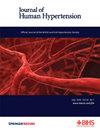Close relationship between electrocardiogram QRS duration and the risk of developing hypertension
IF 3.4
4区 医学
Q2 PERIPHERAL VASCULAR DISEASE
引用次数: 0
Abstract
Electrocardiogram QRS duration is associated with cardiovascular events and all-cause death. The present study was conducted to investigate the hypothesis that the QRS duration predicts the future development of hypertension in the Japanese general population with normal blood pressure. Overall, 13,382 individuals without bundle branch block, Wolff–Parkinson–White syndrome, complete atrioventricular block, pacemaker implantation, or old myocardial infarction on electrocardiogram were enrolled. The cross-sectional analysis indicated that the QRS duration was longer in hypertensive than in normotensive participants. After excluding the participants with hypertension, the remaining 9293 participants with normal blood pressure (male = 5425, 50.2 ± 11.7 years) were followed up for the median of 4 years with an endpoint of hypertension development. During the follow-up period, 1953 participants developed hypertension (50.6 per 1000 person-year). Kaplan–Meier analysis revealed that the incidence of hypertension increased across the quartiles of participants based on QRS duration at baseline as 39.0, 48.6, 53.7, and 62.4 per 1000 person-years in the first, second, third, and fourth quartiles, respectively. Univariate analysis confirmed a significant impact of QRS duration on the development of hypertension. In the multivariate Cox hazard regression analysis adjusted for possible confounding variables, QRS duration was an independent predictor of the development of hypertension. These results suggest the close association between electrocardiogram QRS duration and the future development of hypertension in the Japanese general population. Moreover, alterations in the intraventricular conduction may precede clinically apparent hypertension.

心电图QRS持续时间与高血压发病风险密切相关。
心电图QRS持续时间与心血管事件和全因死亡相关。本研究旨在探讨在血压正常的日本普通人群中QRS持续时间预测高血压未来发展的假设。总的来说,13,382例无束支传导阻滞、Wolff-Parkinson-White综合征、完全性房室传导阻滞、起搏器植入或心电图上的陈旧性心肌梗死的个体被纳入研究。横断面分析表明,高血压患者QRS持续时间比正常患者更长。在排除高血压患者后,剩余9293名血压正常的受试者(男性5425人,50.2±11.7岁)随访,随访时间中位数为4年,以高血压发展为终点。在随访期间,1953名参与者患上高血压(每1000人年50.6人)。Kaplan-Meier分析显示,基于基线时QRS持续时间,参与者的高血压发病率在第一、第二、第三和第四四分位数分别为每1000人年39.0、48.6、53.7和62.4。单因素分析证实QRS持续时间对高血压的发展有显著影响。在对可能的混杂变量进行校正的多变量Cox风险回归分析中,QRS持续时间是高血压发展的独立预测因子。这些结果提示,在日本普通人群中,心电图QRS持续时间与高血压的未来发展密切相关。此外,脑室传导的改变可能先于临床表现明显的高血压。
本文章由计算机程序翻译,如有差异,请以英文原文为准。
求助全文
约1分钟内获得全文
求助全文
来源期刊

Journal of Human Hypertension
医学-外周血管病
CiteScore
5.20
自引率
3.70%
发文量
126
审稿时长
6-12 weeks
期刊介绍:
Journal of Human Hypertension is published monthly and is of interest to health care professionals who deal with hypertension (specialists, internists, primary care physicians) and public health workers. We believe that our patients benefit from robust scientific data that are based on well conducted clinical trials. We also believe that basic sciences are the foundations on which we build our knowledge of clinical conditions and their management. Towards this end, although we are primarily a clinical based journal, we also welcome suitable basic sciences studies that promote our understanding of human hypertension.
The journal aims to perform the dual role of increasing knowledge in the field of high blood pressure as well as improving the standard of care of patients. The editors will consider for publication all suitable papers dealing directly or indirectly with clinical aspects of hypertension, including but not limited to epidemiology, pathophysiology, therapeutics and basic sciences involving human subjects or tissues. We also consider papers from all specialties such as ophthalmology, cardiology, nephrology, obstetrics and stroke medicine that deal with the various aspects of hypertension and its complications.
 求助内容:
求助内容: 应助结果提醒方式:
应助结果提醒方式:


